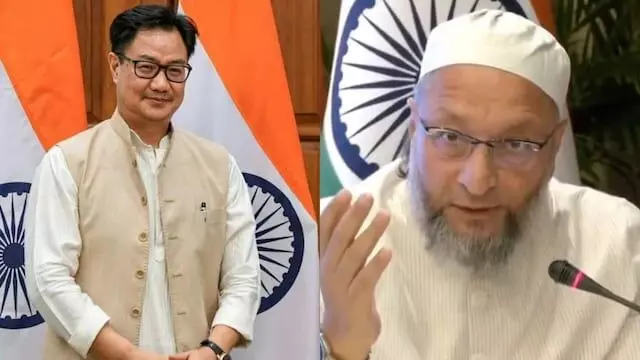Rijiju-Owaisi Face-Off Over Minority Rights Sparks Heated Political Exchange

A sharp political exchange erupted between Union Minister Kiren Rijiju and AIMIM chief Asaduddin Owaisi after Rijiju claimed that India is the only country where minorities enjoy extensive facilities, drawing a strong rebuke from the Hyderabad MP.
Rijiju, who serves as Union Minister for Minority Affairs, accused opposition parties—especially Congress—of playing “vote bank politics” and misleading minorities for political gain. Referring to the ongoing controversy over the special revision of electoral rolls in Bihar, he said, “There are six officially recognized minority communities—Muslims, Sikhs, Christians, Parsis, Jains, and Buddhists—and all enjoy the same rights and facilities as the majority community. In fact, minorities are given additional protections. There is no country in the world that provides such benefits to its minorities.”
He went on to blame the Congress for allegedly keeping Muslims “poor and dependent” to use them as a vote bank. “Now they should not shout ‘Muslim, Muslim’ and insult them,” he said, adding that the BJP does not do politics based on religion or caste and considers itself a secular party.
Owaisi hit back strongly, questioning whether being routinely labeled “Pakistani, Bangladeshi, jihadi, or Rohingya” counts as a benefit. “Is it ‘protection’ to be lynched? To have our homes, mosques, and shrines bulldozed? To be pushed across the border?” he asked in a series of pointed posts on X.
The AIMIM leader said that minority rights are fundamental rights—not charity—and reminded Rijiju that he holds a constitutional post, “not a throne.” He accused the government of making Indian Muslims feel like “hostages,” stating, “We are not even second-class citizens anymore.”
Owaisi also criticized the government’s actions on education and minority welfare. He pointed to the discontinuation of the Maulana Azad National Fellowship, defunding of the pre-matric scholarship, and reduction in post-matric and merit-cum-means scholarships. “Muslims are now the only group whose presence in higher education is declining,” he claimed, citing government data.
He raised concerns over the Waqf Board structure, alleging that the Waqf Amendment Act allows non-Muslims to dominate Muslim religious boards. “Can Muslims be members of Hindu Endowment Boards? No. But non-Muslims can form a majority in Waqf Boards,” he said.
Owaisi emphasized that minorities are not asking for privileges but for what the Constitution guarantees: “social, economic, and political justice.”
Rijiju responded by questioning why minorities in neighboring countries migrate to India, but Indian minorities don’t leave. “PM Modi’s schemes benefit everyone. The Ministry of Minority Affairs gives additional support to minorities,” he said.
But Owaisi fired back, calling Rijiju “Hon’ble Minister Against Minorities.” He said, “If we haven’t migrated, it’s not because we’re happy. We didn’t run from the British, from Partition, or after the massacres in Nellie, Gujarat, Moradabad, or Delhi.”
He concluded by saying, “Stop comparing our great nation to failed states like Pakistan and Myanmar. We know how to fight for our rights. Jai Hind, Jai Samvidhan!”
The heated back-and-forth has added fresh fuel to the ongoing debate on the state of minority rights and representation in India, especially in the run-up to key state and national elections.
